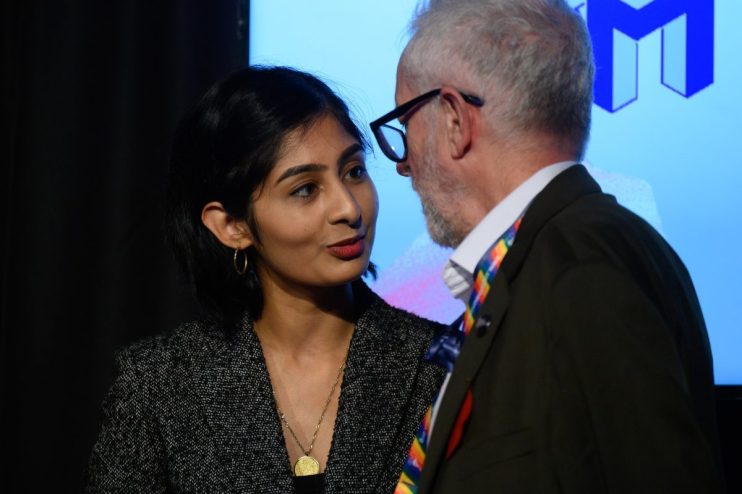Corbyn, Sultana and the politics of ‘someone else will pay’

Zarah Sultana’s shaky launch of a new left-wing movement highlights the false promise of cost-free socialism, offering voters an unrealistic alternative to the tough economic choices facing Britain, writes Eliot Wilson
It did not bode well for a new powerful left-wing voice in British politics. When Coventry South MP Zarah Sultana recently announced she was leaving the Labour Party to “co-lead” the founding of a new group with Jeremy Corbyn, she forgot to consult with… Jeremy Corbyn. The former Labour leader congratulated Sultana on her “principled decision” but was supposedly left “bewildered”: he said only that “discussions are ongoing — and I am excited to work alongside all communities to fight for the future people deserve”.
It was all good, harmless fun and an opportunity to speculate about the ability of left-wing Labour (and former Labour) MPs to organise brewery-based celebrations, but the development should not be dismissed. The idea that, in Sultana’s words, the “two-party system offers nothing but managed decline and broken promises” will resonate with many voters; and there is a substantial constituency among them for whom the saloon-bar blend of half-understood Thatcherism and nativist anti-immigration offered by Reform UK is not and can never be the solution.
The tectonic plates of Westminster may not have shifted in Sultana’s favour. Notably, Corbyn’s former shadow chancellor, Hayes and Harlington MP John McDonnell, did not sign up to the new party: his left-wing radicalism puts him beyond the pale for many but he is clever, articulate and influential. Fellow far-left veteran Diane Abbott, shadow home secretary under Corbyn, also decided not to make the move. But polling suggests that a party with progressive policies on poverty, the cost of living and the conflict in Gaza could attract something like ten per cent of the voters in urban areas who supported Labour in 2019. In a fractured political landscape, that could be an important voting bloc.
Labour splits
The fracture has been fuelled, of course, by recent disagreements within the Labour Party over proposed cuts to welfare payments and the likelihood of tax increases in this autumn’s Budget. The government was forced to gut its Universal Credit and Personal Independence Payment Bill of virtually all its operative clauses to secure its passage through the House of Commons, and measures that it hoped would save up to £5bn will now be cost-neutral.
The Prime Minister is facing an emboldened Parliamentary Labour Party many of whom want more public expenditure, not less, are unwilling to accept any trade-offs and decry most additional taxation to pay for it. Most, but not all: there is an abiding belief in the idea of somehow finding a levy on rich individuals or large businesses which will fund any new spending.
This is the politics of “someone else will pay”. We can have lavishly funded public services, generous welfare and huge investment in infrastructure, and it will all be paid for by some nebulous conception of “the rich”. Better still, the rich can be a source of revenue without any negative economic consequences. The danger of capital flight is shrugged off, and ultimately you have the sixth-form inanity of Zohran Mamdani, the Democratic nominee for mayor of New York, who remarked casually in a recent interview “I don’t think that we should have billionaires”.
Questioned about a wealth tax, Richard Burgon flailed sweatily to a non-answer
A popular solution at the moment is a wealth tax. Richard Burgon, another luminary of the Corbyn front bench, was pressed on the details by Sophy Ridge on Sky News last week, and flailed sweatily to a non-answer. Burgon may not be one of the left’s deepest thinkers, but as Dr Kristian Niemietz of the Institute of Economic Affairs pointed out in this paper last week, a wealth tax is a “political zombie”. The idea has gradually been abandoned across developed economies because it fundamentally impedes the formation of capital.
The philosophy which runs through this part of the left and suffuses the new movement of Zarah Sultana, Jeremy Corbyn and others is the antithesis of the “tough decisions” Sir Keir Starmer is so fond of talking about. It seeks to persuade voters that these decisions are in fact unnecessary, and it is simply the courage to stand up to vested interests which is required to achieve a socialist paradise.
Whether from ignorance or mendacity, that is an attempt to deceive the electorate. It is a false promise, of generous state largesse at no cost – except to a nebulous “other” – and it is doomed to failure. We need to call it out and argue for an economic approach which will achieve the growth and prosperity we all need.
Eliot Wilson is a writer
Disclaimer: Investing carries risk. This is not financial advice. The above content should not be regarded as an offer, recommendation, or solicitation on acquiring or disposing of any financial products, any associated discussions, comments, or posts by author or other users should not be considered as such either. It is solely for general information purpose only, which does not consider your own investment objectives, financial situations or needs. TTM assumes no responsibility or warranty for the accuracy and completeness of the information, investors should do their own research and may seek professional advice before investing.
Most Discussed
- 1
- 2
- 3
- 4
- 5
- 6
- 7
- 8
- 9
- 10